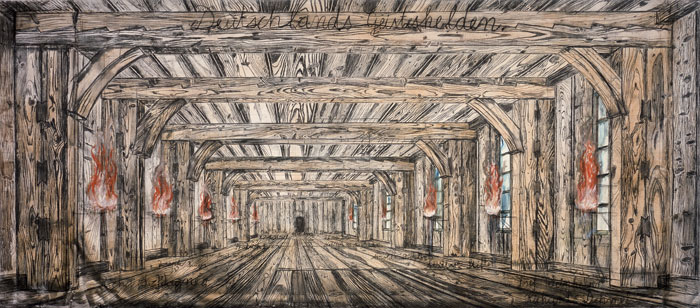
Anselm Kiefer Deutschlands Geisteshelden (Germany’s Spiritual Heroes) 1973 oil and charcoal on burlap, mounted on canvas 121" x 268.5"
Still a home for Dichter und Denker
Five major events in German history* are directly connected to November 9, the most recent being the fall of the Berlin Wall, twenty years ago today. Whatever else we make of it, the anniversary of this latest in a series of fateful moments should be a timely reminder, in our contemporary obsession with the present, that everything has a story, if not a reason. Of course I'm talking about history.
"The German Problem".
Historians don't record statesmen and diplomats ever speaking of an enduring "French Problem" or a persistent "English Problem" (although I believe Americans should be more aware than we are that the rest of the world is increasingly thinking of an intensifying and abiding "American Problem"), but over hundreds of years, even two thousand years, for the Romans, the Byzantines, the Carolingians, all the Slavs, the French, Poles, the Danes, the Belgians and the Dutch, the Russians, the Balts, even the Spanish, and, irregularly, the British, there was always something on the order of what would eventually be known as "the German Problem".
The problem was recognized or imagined by non-Germans as the perceived threat of a large and vigorous people without natural borders. The danger was to be minimized by means of policies which would contain the Germans geographically, limit their economic authority, and, by the later nineteenth century, assemble and maintain counterweights to their real or potential power in a united nation-state. It worked pretty well while "Germany" consisted of hundreds of mostly-independent realms (Reiche), and especially during periods when Germans were enduring or recovering from plagues and dynastic battles. The horrible ravages of the Thirty Years War were mostly visited on central Europe (viz., the Germans), but in the midst of the impressive economic and cultural resurgence which followed those religious "crusades" a new player, Prussia, equipped with a modern bureaucracy and a highly-trained standing army, appeared on the field, almost out of nowhere, eventually to succesfully engage with, or seduce, the cultural forces of nationalism in founding the Second German Reich.
Whatever the merits of the proposition, for much of the planet the most important lesson to be learned from two twentieth-century world wars was the imperative of eliminating "the German Problem" once again, and this time for good.
Then suddenly the unexpected, the inexplicable happened, confounding everyone's expectations. The Berlin wall fell, the Soviet bloc and its system collapsed, Germany was peacefully reunited.
New York Times Berlin Bureau Chief, Nicholas Kulish, in a piece in the paper two days ago quoted Robert E. Hunter, senior adviser at the RAND Corporation and an ambassador to NATO under President Bill Clinton. Hunter was able to describe the profound significance of what happened in 1989. After recalling the fears of those observing from the outside that the sudden appearance of "this thing in the center of Europe, if it were allowed to become unified, was going to be a cancer once again and lead to Act III of the great European tragedy." Instead, he continued, "the German problem, which emerged with the unifying of Germany beginning in the 1860s, is one of the few problems in modern history that has been solved.”
Okay, now my eyes were too wet to immediately read further.
Four months after the proclamation of the united German Empire inside the Hall of Mirrors of the occupied Palace of Versailles, the German Austrian composer Johannes Brahms completed a large-scale piece for chorus and orchestra.
Tonight I'm going to be listening to a recording of Brahms' Schicksalsied to accompany thoughts of the deep sadness and unbridled joy linked with this date. Brahms wrote it after reading a poem by Hölderlin which was included in the author's 1797 novel of letters, "Hyperion". The poet had been inspired by the freedom struggle of the Greeks and in these lines he contrasted the glorious world of their ancient gods with a mankind continually threatened by Schicksal (destiny).
The text appears here, in both German and an English translation.
I've just now listened to a sample of the Brahms on line and I was reminded of how much of it relates to the music of his near contemporary, the German German composer Richard Wagner, represented at the time of its composition as Brahms' musical antithesis, that is, defined so by the passionate factions of each. Together they created the Brahms-Wagner "War of the Romantics", which disfigured musical life in the second half of the nineteenth century, but which, so far as I can tell, resulted in no fatalities.
*
the symbolic collapse of the Revolution of 1848, the collapse of the monarchy in 1918, the 1923 Beer Hall Putsch, Kristallnacht in 1938, and the fall of the Berlin Wall in 1989
[image from lacma]